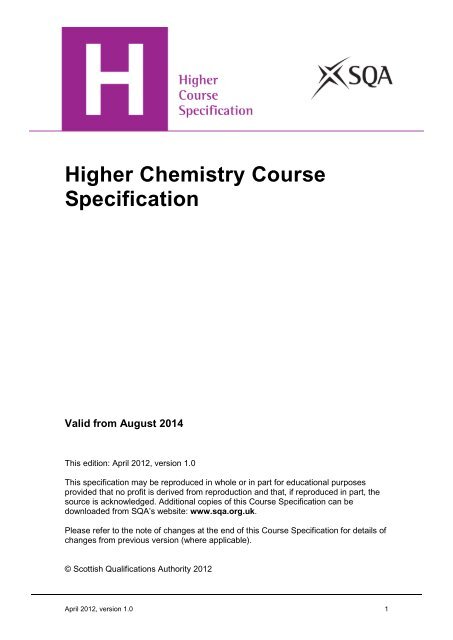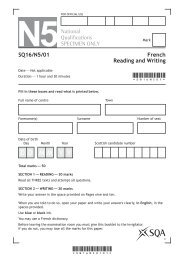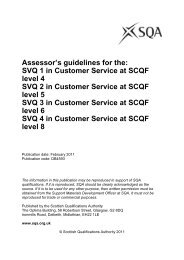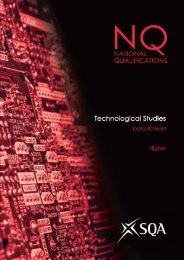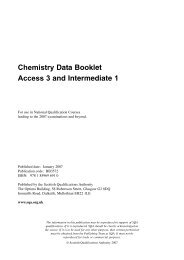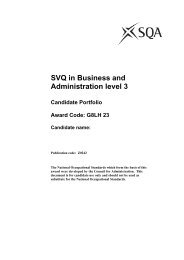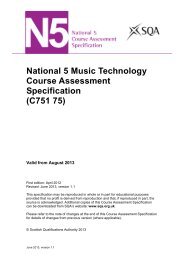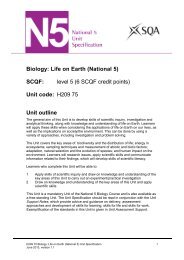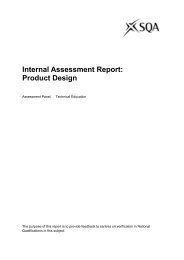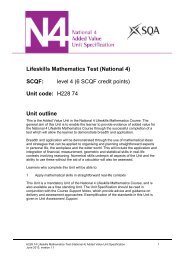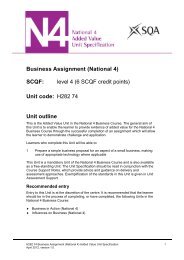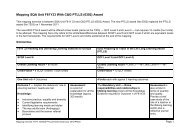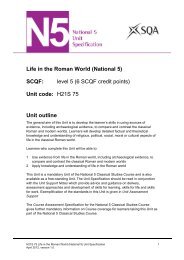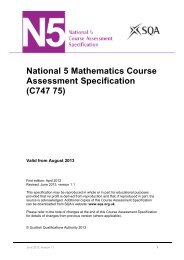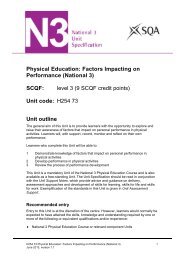Higher Chemistry Course Specification - Scottish Qualifications ...
Higher Chemistry Course Specification - Scottish Qualifications ...
Higher Chemistry Course Specification - Scottish Qualifications ...
Create successful ePaper yourself
Turn your PDF publications into a flip-book with our unique Google optimized e-Paper software.
<strong>Higher</strong> <strong>Chemistry</strong> <strong>Course</strong><br />
<strong>Specification</strong><br />
Valid from August 2014<br />
This edition: April 2012, version 1.0<br />
This specification may be reproduced in whole or in part for educational purposes<br />
provided that no profit is derived from reproduction and that, if reproduced in part, the<br />
source is acknowledged. Additional copies of this <strong>Course</strong> <strong>Specification</strong> can be<br />
downloaded from SQA’s website: www.sqa.org.uk.<br />
Please refer to the note of changes at the end of this <strong>Course</strong> <strong>Specification</strong> for details of<br />
changes from previous version (where applicable).<br />
© <strong>Scottish</strong> <strong>Qualifications</strong> Authority 2012<br />
April 2012, version 1.0 1
<strong>Course</strong> outline<br />
<strong>Course</strong> title:<br />
SCQF:<br />
<strong>Course</strong> code:<br />
<strong>Higher</strong> <strong>Chemistry</strong><br />
level 6 (24 SCQF credit points)<br />
to be advised<br />
Mandatory Units<br />
Chemical Changes and Structure (<strong>Higher</strong>)<br />
Researching <strong>Chemistry</strong> (<strong>Higher</strong>)<br />
Nature’s <strong>Chemistry</strong> (<strong>Higher</strong>)<br />
<strong>Chemistry</strong> in Society (<strong>Higher</strong>)<br />
3 SCQF credit points<br />
3 SCQF credit points<br />
6 SCQF credit points<br />
6 SCQF credit points<br />
<strong>Course</strong> assessment<br />
6 SCQF credit points<br />
This <strong>Course</strong> includes six SCQF credit points to allow additional time for preparation for<br />
<strong>Course</strong> assessment. The <strong>Course</strong> assessment covers the added value of the <strong>Course</strong>.<br />
Further information on the <strong>Course</strong> assessment is provided in the Assessment section.<br />
Recommended entry<br />
Entry to this <strong>Course</strong> is at the discretion of the centre. However, learners would normally<br />
be expected to have attained the skills, knowledge and understanding required by the<br />
following or equivalent qualifications and/or experience:<br />
National 5 <strong>Chemistry</strong> <strong>Course</strong> or relevant component Units<br />
Progression<br />
This <strong>Course</strong> or its Units may provide progression to:<br />
Advanced <strong>Higher</strong> <strong>Chemistry</strong><br />
other qualifications in <strong>Chemistry</strong> or related areas<br />
further study, employment and/or training<br />
Further details are provided in the Rationale section.<br />
Equality and inclusion<br />
This <strong>Course</strong> <strong>Specification</strong> has been designed to ensure that there are no unnecessary<br />
barriers to learning or assessment. The individual needs of learners should be taken<br />
into account when planning learning experiences, selecting assessment methods or<br />
considering alternative evidence. For further information, please refer to the <strong>Course</strong><br />
Support Notes.<br />
April 2012, version 1.0 2
Rationale<br />
All new and revised National <strong>Course</strong>s reflect Curriculum for Excellence values,<br />
purposes and principles. They offer flexibility, provide more time for learning, more<br />
focus on skills and applying learning, and scope for personalisation and choice.<br />
In this <strong>Course</strong>, and its component Units, there will be an emphasis on skills<br />
development and the application of those skills. Assessment approaches will be<br />
proportionate, fit for purpose and will promote best practice, enabling learners to<br />
achieve the highest standards they can.<br />
This <strong>Course</strong> provides learners with opportunities to continue to acquire and develop the<br />
attributes and capabilities of the four capacities as well as skills for learning, skills for<br />
life and skills for work.<br />
All <strong>Course</strong>s provide opportunities for learners to develop breadth, challenge and<br />
application, but the focus and balance of the assessment will be appropriate for the<br />
subject area.<br />
Relationship between the <strong>Course</strong> and Curriculum for<br />
Excellence values, purposes and principles<br />
<strong>Chemistry</strong>, the study of matter and its interactions, contributes essential knowledge and<br />
understanding across all aspects of our lives. <strong>Chemistry</strong> explains the links between the<br />
particulate nature of matter and the macroscopic properties of the world. <strong>Chemistry</strong><br />
research and development is essential for the introduction of new products. The<br />
chemical industry is a major contributor to the economy of the country.<br />
<strong>Chemistry</strong> <strong>Course</strong>s should encourage resilience, which leads to becoming a confident<br />
individual. Successful learners in chemistry think creatively, analyse and solve<br />
problems. <strong>Chemistry</strong> can produce responsible citizens through studying the impact it<br />
makes on developing sustainability and its effect on the environment, society, and the<br />
lives of themselves and others.<br />
The <strong>Course</strong> provides opportunities for learners to recognise the impact chemistry<br />
makes on developing sustainability, and its effects on the environment, on society and<br />
on the lives of themselves and others.<br />
An experimental and investigative approach is used to develop knowledge and<br />
understanding of chemistry concepts.<br />
Purpose and aims of the <strong>Course</strong><br />
The purpose of the <strong>Course</strong> is to develop learners’ curiosity, interest and enthusiasm for<br />
chemistry in a range of contexts. The skills of scientific inquiry and investigation are<br />
developed throughout the <strong>Course</strong>. The relevance of chemistry is highlighted by the<br />
study of the applications of chemistry in everyday contexts. This will enable learners to<br />
become scientifically literate citizens, able to review the science-based claims they will<br />
meet.<br />
The <strong>Course</strong> provides well-mapped concept and skills development pathways. The<br />
<strong>Course</strong> develops scientific understanding of issues relating to chemistry, and uses the<br />
April 2012, version 1.0 3
development of chemical theory to build an extensive set of skills for learners. Through<br />
application of a detailed knowledge and understanding of chemical concepts, in<br />
practical situations, learners develop an appreciation of the impact of chemistry on their<br />
everyday lives. The <strong>Course</strong> gives the opportunities for learners to develop the ability to<br />
think analytically, creatively and independently, and to make reasoned evaluations. By<br />
using the broad skills base and knowledge and understanding of detailed chemistry<br />
concepts, learners will become scientifically literate citizens.<br />
It offers a broad, versatile and adaptable skills set which is valued in the workplace,<br />
and forms the basis for progress onto study of chemistry at a higher level, while also<br />
providing a knowledge base useful in the study of all of the sciences.<br />
The main aims of this <strong>Course</strong> are for learners to:<br />
develop and apply knowledge and understanding of chemistry<br />
develop an understanding of chemistry’s role in scientific issues and relevant<br />
applications of chemistry, including the impact these could make in society and the<br />
environment<br />
develop scientific inquiry and investigative skills<br />
develop scientific analytical thinking skills, including scientific evaluation, in a<br />
chemistry context<br />
develop the use of technology, equipment and materials, safely, in practical<br />
scientific activities, including using risk assessments<br />
develop planning skills<br />
develop problem solving skills in a chemistry context<br />
use and understand scientific literacy to communicate ideas and issues and to<br />
make scientifically informed choices<br />
develop the knowledge and skills for more advanced learning in chemistry<br />
develop skills of independent working<br />
The <strong>Course</strong> also serves to equip all learners with an understanding of the impact of<br />
chemistry on everyday life, and with the knowledge and skills to be able to reflect<br />
critically on scientific and media reports. This will also equip learners to make their own<br />
reasoned decisions on many issues within a modern society where the body of<br />
scientific knowledge and its applications and implications are ever developing.<br />
The <strong>Course</strong> content has been selected to allow learners to study key chemical areas<br />
within situations of personal relevance using up-to-date contexts. Skills of scientific<br />
investigation, communication skills, literacy and numeracy are all developed within the<br />
<strong>Course</strong>. The Units offer opportunities for collaborative and independent learning, set<br />
within familiar and unfamiliar contexts, and for high-quality experimental work.<br />
Information about typical learners who might do the <strong>Course</strong><br />
The <strong>Course</strong> is suitable for learners who are secure in their attainment of<br />
National 5 <strong>Chemistry</strong> or an equivalent qualification. The <strong>Course</strong> may be suitable for<br />
those wishing to study chemistry for the first time.<br />
This <strong>Course</strong> emphasises practical and experiential learning opportunities, with a strong<br />
skills-based approach to learning. It takes account of the needs of all learners, and<br />
provides sufficient flexibility to enable learners to achieve in different ways.<br />
April 2012, version 1.0 4
<strong>Chemistry</strong> <strong>Course</strong>s are offered from SCQF level 3 to SCQF level 7. Vertical<br />
progression is possible through these levels, while lateral progression is possible to<br />
other qualifications in the sciences. This <strong>Course</strong> can also assist entry to employment,<br />
training and further education.<br />
April 2012, version 1.0 5
<strong>Course</strong> structure and conditions of award<br />
<strong>Course</strong> structure<br />
Units are statements of standards for assessment and not programmes of learning and<br />
teaching. They can be delivered in a number of ways.<br />
Units can be taught sequentially or in parallel to each other. However, learning and<br />
teaching approaches should provide opportunities to integrate skills, where possible.<br />
Each of the component Units is designed to provide progression to the Advanced<br />
<strong>Higher</strong> <strong>Chemistry</strong> <strong>Course</strong>.<br />
Chemical Changes and Structure (<strong>Higher</strong>)<br />
This Unit covers the knowledge and understanding of controlling reaction rates and<br />
periodic trends, and strengthens the learner’s ability to make reasoned evaluations by<br />
recognising underlying patterns and principles. Learners will investigate collision theory<br />
and the use of catalysts in reactions. Learners will explore the concept of electronegativity<br />
and intra-molecular and intermolecular forces. The connection between<br />
bonding and a material's physical properties is investigated.<br />
Researching <strong>Chemistry</strong> (<strong>Higher</strong>)<br />
This Unit covers the key skills necessary to undertake research in chemistry. Learners<br />
will research the relevance of chemical theory to everyday life by exploring the<br />
chemistry behind a topical issue. Learners will develop the key skills associated with<br />
collecting and synthesising information from a number of different sources. Equipped<br />
with the knowledge of common chemistry apparatus and techniques, they will plan and<br />
undertake a practical investigation related to a topical issue. Using their scientific<br />
literacy skills, learners will communicate their results and conclusions.<br />
Nature’s <strong>Chemistry</strong> (<strong>Higher</strong>)<br />
This Unit covers the knowledge and understanding of organic chemistry within the<br />
context of the chemistry of food and the chemistry of everyday consumer products,<br />
soaps, detergents, fragrances and skincare. The relationship between the structure of<br />
organic compounds, their physical and chemical properties and their uses are<br />
investigated. Key functional groups and types of organic reaction are covered.<br />
<strong>Chemistry</strong> in Society (<strong>Higher</strong>)<br />
This Unit covers the knowledge and understanding of the principles of physical<br />
chemistry which allow a chemical process to be taken from the researcher's bench<br />
through to industrial production. Learners will calculate quantities of reagents and<br />
products, percentage yield and the atom economy of processes. They will develop<br />
skills to manipulate dynamic equilibria and predict enthalpy changes. Learners will<br />
investigate the ability of substances to act as oxidising or reducing agents and their use<br />
in analytical chemistry through the context of volumetric titrations. Learners will use<br />
analytical chemistry to determine the purity of reagents and products.<br />
Conditions of award<br />
To gain the award of the <strong>Course</strong>, the learner must pass all of the Units as well as the<br />
<strong>Course</strong> assessment. The required Units are shown in the <strong>Course</strong> outline section.<br />
<strong>Course</strong> assessment will provide the basis for grading attainment in the <strong>Course</strong> award.<br />
April 2012, version 1.0 6
Skills, knowledge and understanding<br />
Further information on the assessment of the skills, knowledge and understanding for<br />
the <strong>Course</strong> is given in the <strong>Course</strong> Assessment <strong>Specification</strong>. A broad overview of the<br />
mandatory subject skills, knowledge and understanding that will be assessed in the<br />
<strong>Course</strong> is given in this section.<br />
This includes:<br />
demonstrating knowledge and understanding of chemistry by making statements,<br />
describing information, providing explanations and integrating knowledge<br />
applying knowledge of chemistry to new situations, interpreting information and<br />
solving problems<br />
planning or designing experiments<br />
safely carrying out experiments, recording detailed observations and collecting data<br />
selecting and presenting information appropriately in a variety of forms<br />
processing information (using calculations, significant figures and units, where<br />
appropriate)<br />
making predictions and generalisations from evidence/information<br />
drawing valid conclusions and giving explanations supported by<br />
evidence/justification<br />
evaluating experimental procedures by identifying sources of error and suggesting<br />
improvements<br />
communicating findings/information<br />
Skills, knowledge and understanding to be included in the <strong>Course</strong> will be appropriate to<br />
the SCQF level of the <strong>Course</strong>. The SCQF level descriptors give further information on<br />
characteristics and expected performance at each SCQF level (www.sqa.org.uk/scqf).<br />
April 2012, version 1.0 7
Assessment<br />
Information about assessment for the <strong>Course</strong> is included in the <strong>Course</strong> Assessment<br />
<strong>Specification</strong>, which provides full details including advice on how a learner’s overall<br />
attainment for the <strong>Course</strong> will be determined.<br />
Unit assessment<br />
All Units are internally assessed against the requirements shown in the Unit<br />
<strong>Specification</strong>.<br />
They can be assessed on a Unit-by-Unit basis or by combined assessment.<br />
They will be assessed on a pass/fail basis within centres. SQA will provide rigorous<br />
external quality assurance, including external verification, to ensure assessment<br />
judgments are consistent and meet national standards.<br />
The assessment of the Units in this <strong>Course</strong> will be as follows.<br />
Chemical Changes and Structure (<strong>Higher</strong>)<br />
Learners who complete the Unit will be able to:<br />
apply skills of scientific inquiry and draw on knowledge and understanding of the<br />
key areas of this Unit to carry out an experiment<br />
draw on knowledge and understanding of the key areas of this Unit and apply<br />
scientific skills<br />
Researching <strong>Chemistry</strong> (<strong>Higher</strong>)<br />
Learners who complete the Unit will be able to:<br />
apply skills of scientific inquiry and draw on knowledge and understanding to<br />
research the underlying chemistry<br />
apply skills of scientific inquiry to investigate, through experimentation, the<br />
underlying chemistry<br />
apply skills of scientific inquiry and draw on knowledge and understanding to<br />
prepare a scientific communication for the practical investigation<br />
Nature’s <strong>Chemistry</strong> (<strong>Higher</strong>)<br />
Learners who complete the Unit will be able to:<br />
apply skills of scientific inquiry and draw on knowledge and understanding of the<br />
key areas of this Unit to carry out an experiment<br />
draw on knowledge and understanding of the key areas of this Unit and apply<br />
scientific skills<br />
<strong>Chemistry</strong> in Society (<strong>Higher</strong>)<br />
Learners who complete the Unit will be able to:<br />
apply skills of scientific inquiry and draw on knowledge and understanding of the<br />
key areas of this Unit to carry out an experiment<br />
draw on knowledge and understanding of the key areas of this Unit and apply<br />
scientific skills<br />
April 2012, version 1.0 8
Exemplification of possible assessment approaches for these Units is provided in the<br />
National Assessment Resource.<br />
<strong>Course</strong> assessment<br />
<strong>Course</strong>s from National 4 to Advanced <strong>Higher</strong> include assessment of added value 1 . At<br />
National 5, <strong>Higher</strong> and Advanced <strong>Higher</strong>, the added value will be assessed in the<br />
<strong>Course</strong> assessment. The added value for the <strong>Course</strong> must address the key purposes<br />
and aims of the <strong>Course</strong>, as defined in the <strong>Course</strong> rationale. It will do this by addressing<br />
one or more of breadth, challenge or application.<br />
In the <strong>Higher</strong> <strong>Chemistry</strong> <strong>Course</strong>, added value will focus on:<br />
breadth<br />
challenge<br />
application<br />
Learners will draw on, extend and apply the skills they have learned during the <strong>Course</strong>.<br />
This will be assessed within a question paper 2 and an assignment 3 , requiring<br />
demonstration of the breadth of knowledge, skills and understanding acquired from<br />
across the Units and how they can be applied in unfamiliar contexts and/or integrated<br />
ways.<br />
1 Definitions can be found here: www.sqa.org.uk/sqa/45528.html<br />
2 See link above for definition.<br />
3 See link above for definition.<br />
April 2012, version 1.0 9
Development of skills for learning, skills for life<br />
and skills for work<br />
It is expected that learners will develop broad, generic skills through this <strong>Course</strong>. The<br />
skills that learners will be expected to improve on and develop through the <strong>Course</strong> are<br />
based on SQA’s Skills Framework: Skills for Learning, Skills for Life and Skills for Work<br />
and drawn from the main skills areas listed below. These must be built into the <strong>Course</strong><br />
where there are appropriate opportunities.<br />
1 Literacy<br />
1.2 Writing<br />
2 Numeracy<br />
2.1 Number processes<br />
2.2 Money, time and measurement<br />
2.3 Information handling<br />
5 Thinking skills<br />
5.3 Applying<br />
5.4 Analysing and evaluating<br />
5.5 Creating<br />
Amplification of these skills is given in SQA’s Skills Framework: Skills for Learning,<br />
Skills for Life and Skills for Work. The level of these skills will be appropriate to the<br />
level of the <strong>Course</strong>. Further information on building in skills for learning, skills for life<br />
and skills for work for the <strong>Course</strong> is given in the <strong>Course</strong> Support Notes.<br />
April 2012, version 1.0 10
Administrative information<br />
Published: April 2012 (version 1.0)<br />
Superclass:<br />
to be advised<br />
History of changes to National <strong>Course</strong> <strong>Specification</strong><br />
<strong>Course</strong><br />
details<br />
Version Description of change Authorised<br />
by<br />
Date<br />
April 2012, version 1.0 11


